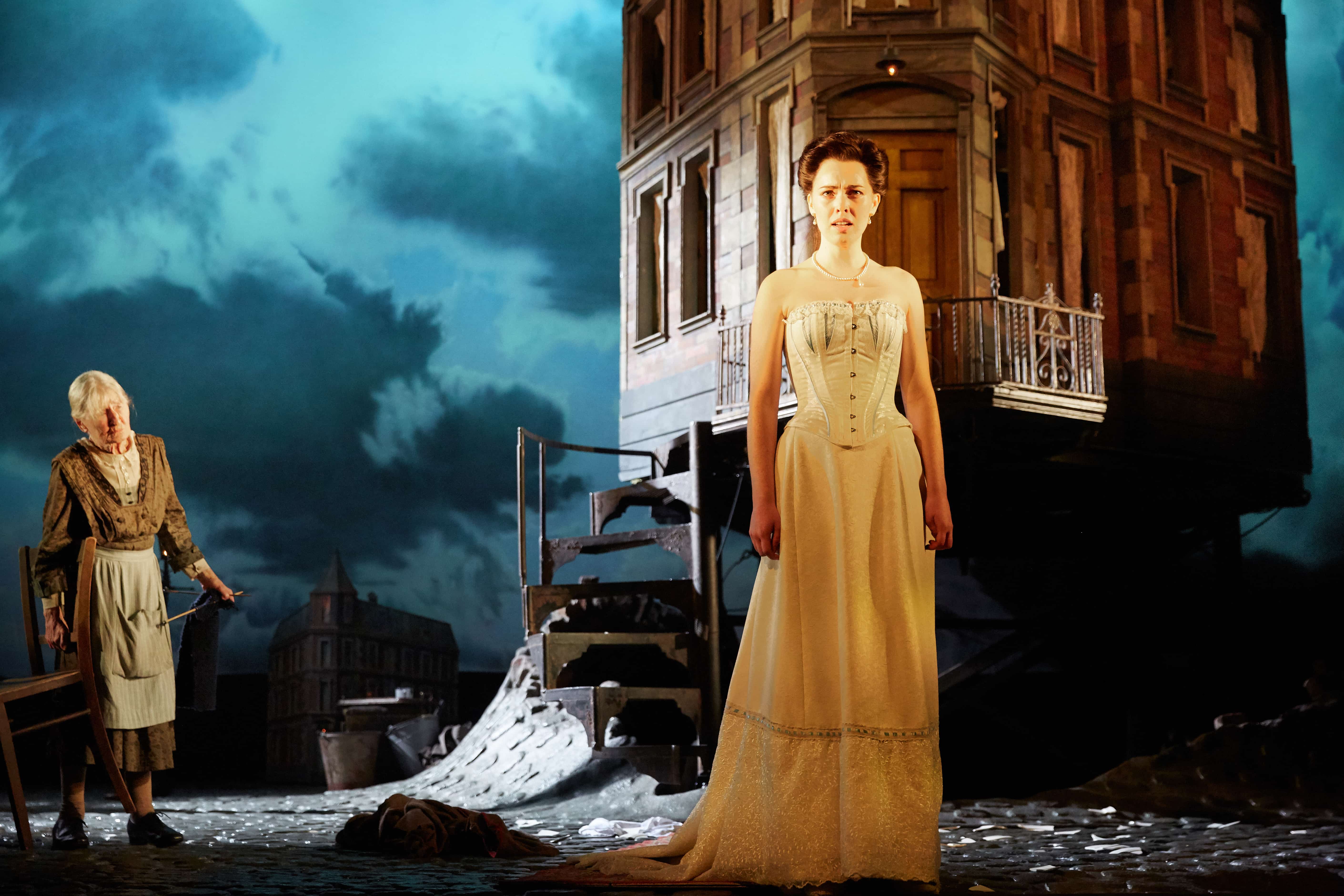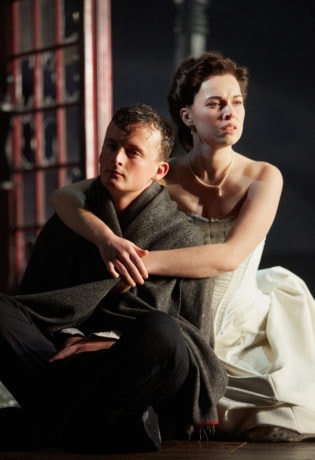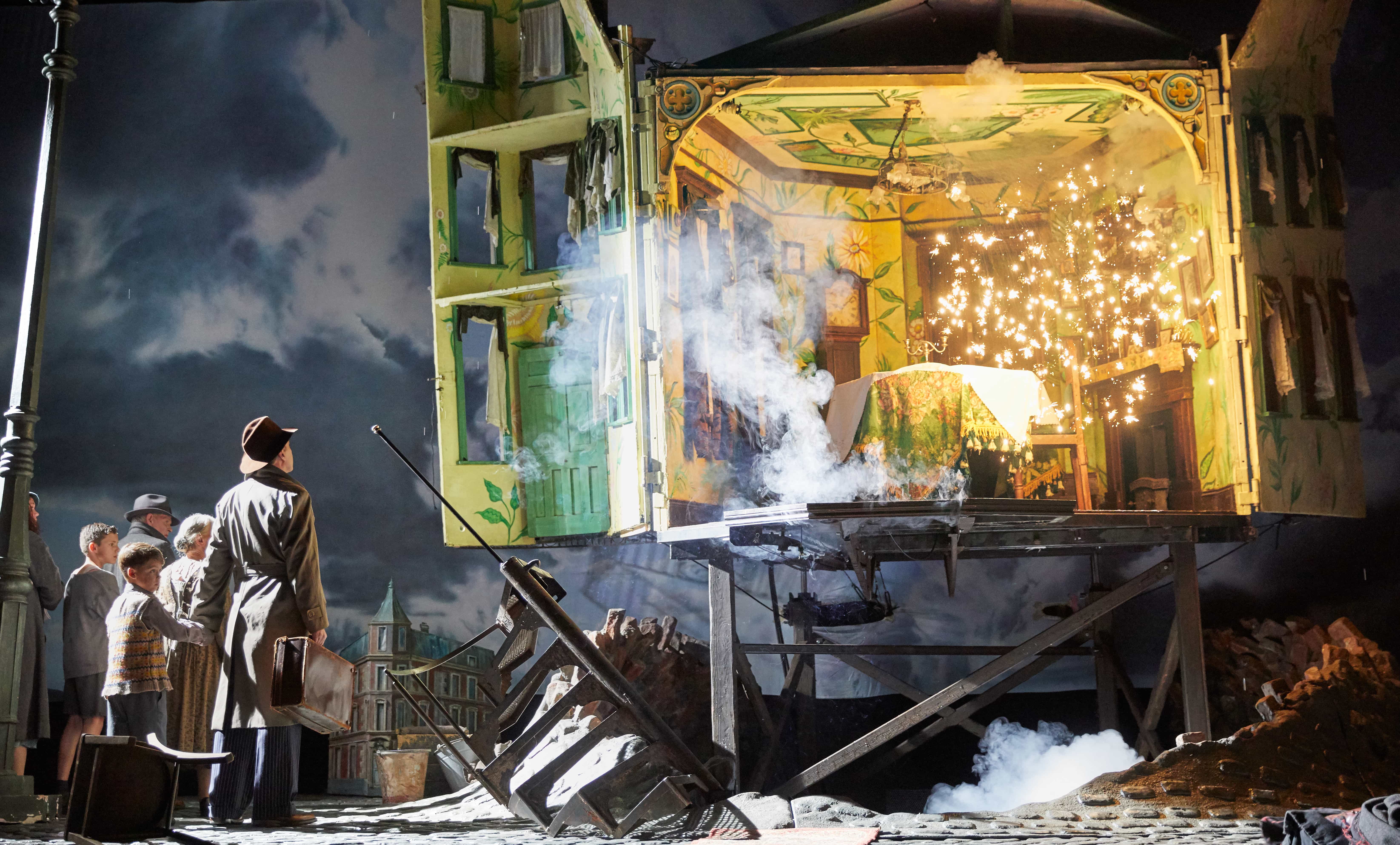The character Lianne Harvey plays in J.B. Priestley’s An Inspector Calls, Sheila Birling, really fascinated me. Sheila stands out as no ordinary ingenue. During the course of the play, Sheila goes from the sheltered sanctimony of her well-to-do family to a shattering recognition of the class stratification that her family’s wealth rests on. I greatly admired Harvey’s performance in the role—and how it models what it means for a character to act with a conscience—so I was grateful for this chance to talk with her.

John: Who is Sheila in the play and who is she to you?
Lianne: When the curtain goes up, you see the Birling family having dinner. Sheila is engaged to Gerald, a well-to-do man of the town, and it’s their engagement party. Sheila is a self-involved, fairly unlikeable individual, a real product of her upbringing. She goes on this massive journey of self-discovery when the Inspector comes in and starts questioning the family; he provokes her in a way she probably hasn’t been before and makes her see her life in a very different light. I think the audience can hopefully see the world through her eyes and are on Sheila’s side by the end of the play.
It’s an absolute honor to play her—to get to be silly and giddy and naughty at the beginning of the play, and then, as she discovers more about the consequences her actions have had, to essentially “grow up” during the course of the production. I like to think of Sheila and Eric, her younger brother, as a voice for the future generation—who will hopefully go on to lead much better lives than Mr. and Mrs. Birling do.
How did you approach that character arc as an actor?

I went in as a blank canvas. I hadn’t seen the production before and hadn’t initially envisioned Sheila in the way that Stephen Daldry had. So I said, “I’m ready to do whatever you want me to do.” And then, once I got the basis of the character, I was able to bring my own ideas to the table.
A number of reviewers have noted the amazing transition you make, taking the character from silly to gritty. It seems really important to the whole play that that transition be clear. It seems important to the playwright J.B. Priestley that the wealthy-class Birling family not be painted with a broad brush but that Sheila and her brother are shown taking ethical exception to the family they came from.
I think so. I’ve learned a lot about Priestley through doing this part. He wrote the play in 1945 when he had been through two world wars. In the First World War, he served as a soldier in the trenches, so he saw a lot first hand. In the Second World War, he had his own radio broadcast, and he talked often about how he would like to see a kinder post-war Britain—it was incredibly popular with the British people. I think the ideas he spoke about in his radio broadcasts propelled him to write the play. He set An Inspector Calls in 1912, which is before either of those wars happened, and he also sets it the same week the Titanic sunk.
I think Priestley wanted to make a very socialist point, and I think that the play still is relevant today because of that. The message at the heart of the play is about society—we are part of one society and we are responsible for each other. I think that still hits home now, I felt it hit home when we were in the UK on our five-week tour before coming over here, and it definitely seems to be resonating with the audiences in Washington. That’s why it continues to be such a special production.
I’m guessing the Daldry production is considerably older than you are.
Even the set is older than I am!

When did you join the show and what had you been doing before?
This production was created 30 years ago, so there have been lots of revivals of it. Liam Brennan who plays the Inspector and Hamish Riddle who plays my brother have done this show three times now. I joined back in August and, after rehearsals, embarked on the five-week UK tour. Before that, I was working with another director doing an Alan Ayckbourn comedy. It was nice to do a farce. Doing that has probably helped me in this show, which seems to be getting lots of laughs in the U.S.
You mentioned on opening night that you can see differences between the UK audiences on that tour and the DC audiences here. Can you say more about that?
Yeah, we love you guys! There is a real readiness to jump on board from the very start. There’s also this very open willingness to laugh, which is great for us. Sometimes it feels like the audience are a character of their own, but we love it because you can tell that the audience are listening. I’m not saying that they weren’t in the UK, but perhaps we’re a tad more self-conscious when it comes to laughing so heartily out loud.
I understand the Daldry production began as a response to Thatcherism in England, and here it is now in the U.S. at a time of Trumpanomics. So I’m interested in your thoughts about how An Inspector Calls lands today in the context of the class system in England and the class system in America.
I do think we’ve come at a time where this show feels particularly relevant. When the play was done after Thatcher, certain lines got tweaked in order to make it even more relevant. Liam who plays the Inspector was telling me that there’s a line in his speech to the audience—
The speech that you think is the end of the play?
Yes. The speech where you think the curtain is going to come down and you are going to applaud. That amazing, transcendent speech which he does so well. There’s a line in it which says we are members of one society; we’re responsible for each other. That line wasn’t originally phrased in the way it is now. It was tweaked after Margaret Thatcher had said something about us not being members of a society; about us being individuals. That was many years ago now and yet we are still seeing this production and that speech have weight. An Inspector Calls is going out there night after night and it’s still landing and it’s still speaking to people.

I have to ask you about that amazing set, that house. What’s it like working with that thing?
Oh my god. I love the set and I’m also terrified of the set!
The thing that’s amazing about this show is the team behind it: you’ve got the direction by Stephen Daldry, an amazing set by Ian MacNeil, and the incredible lighting of Rick Fisher. To add to that, you’ve got the thrilling soundtrack of Stephen Warbeck, and together they create a spectacle for the audience. The set itself is stunning—but when those walls open up and you are up there, in that house on stilts, in that massive frock, it is very scary! It took us a long time to get used to it.
And when it explodes and spouts flames and tilts and spills behind you—?
That moment is absolutely brilliant! This show has been done many times in the UK, and it still gets me every day seeing the house fall down with the music blasting and the bangs and pyros—yeah, it really is a sight to behold.
I happened to see a tweet of yours in which it appeared that you had participated in an anti-Trump protest in London.
I did. A lot of my friends did. We went with our banners and there were thousands and thousands of people lining the London streets. It was massive. When he came over to the UK, I felt that I needed to go and make my voice heard and I’m glad that I went and I stood up for something that I believe in. I wanted to make sure I was on the right side of history.
[Read Sophia Howes’s review of An Inspector Calls.]
[Read John Stoltenberg’s Magic Time! column about An Inspector Calls.]
Running Time: About one hour and 45 minutes, with no intermission.
An Inspector Calls plays through December 23, 2018, at the Shakespeare Theatre Company, performing at Sidney Harman Hall, 610 F Street NW, Washington, DC. For tickets, call the box office at (202) 547-1122, or go online.




